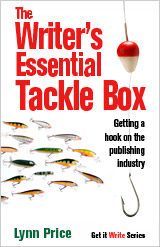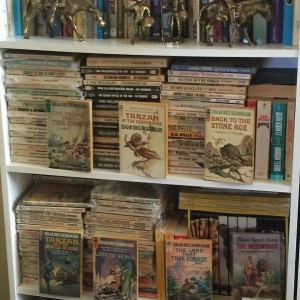(I’ve said before that good writing never goes out of style. Nor do good writing tips. Here is another post from a few years ago via the Wayback Machine.)
You writers out there: if you want to learn more about the wild and crazy publishing business, you’ve got to read Lynn Price’s book, The Writer’s Essential Tackle Box: Getting a Hook on the Publishing Industry. Lynn is the editorial director of Behler Publications, a small, successful boutique press. I had the honor of being interviewed by Lynn for the chapter on Independent Editing. Here is a portion of our Q&A session from a few years ago.
 Q: What is an independent editor, and why do writers need one?
Q: What is an independent editor, and why do writers need one?
A: Literary agents state that they return (read: reject) 99 percent of all manuscripts that are submitted to them. A writer, especially an unpublished one, needs every conceivable edge to become part of the one percent that will find representation. It is not enough that a writer’s spouse, her sister-in-law, or her nephew loved her manuscript. This initial “fan base” only serves to stroke egos while offering little in the way of constructive critiquing—unless, of course, they are professionals in the field, which is seldom the case.
An experienced independent editor/writing coach can prove invaluable to a writer. For starters, he is not part of your “fan club” and will look at your project in an objective manner. Let’s say, for example, that you want to have a fiction manuscript evaluated. A skilled editor will look for the following: Does the story immediately grab a reader’s attention (the “hook”)? Are the characters believable? Is the dialogue powerful, and have you balanced it well enough with your narrative? Have you chosen effective point-of-view characters to tell your story? Is your setting realistic? Have you framed your plot well? Is your pacing consistent?

Lynn Gard Price
But beyond all of the details involved in helping a writer develop a submission-ready manuscript, perhaps the single most important service that an independent editor can offer is to see that the new writer handles every aspect of this venture in a PROFESSIONAL manner. The word “PROFESSIONAL” cannot be emphasized enough. I have heard more than my share of literary agents complain about the lack of professionalism from so many of the writers that contact them. A professional approach to marketing your manuscript is often the edge you need for your manuscript to become part of the aforementioned one percent.
This true story illustrates the point about professionalism, or lack thereof. At a writers’ conference, a significant literary agent who had been networked from the moment she set foot in the building needed a break. She went to the ladies’ room, entered a stall and sat down to take care of business. Suddenly, a manuscript came sliding under the stall door. There followed the patter of little feet as the perpetrator hastily exited the ladies’ room. (Had I been in the stall, my response would have likely been, “Thank you, I just ran out of paper in here.”)
Q: How did the idea of independent editors come about? Is this something publishing houses wanted to take the load off of them?
A: This might be a “chicken or egg” question. Let’s go back in time to when there were few literary agents and fewer, if any, independent editors. Writers mostly submitted their manuscripts right to publishing houses, and the editors there would review a considerable portion of the submission—unless it proved totally unreadable—before either rejecting the project or taking it on. The editor would then work closely with the writer through all of the stages of the revision process to elevate the manuscript to “publishing-ready” status. For the most part, those days are long gone.
As publishing became more of a “bottom-line” business, smaller publishing houses began to merge under large corporate umbrellas. Harried editors found themselves reading submissions for two, three, or even more imprints. Attention spans grew shorter, tolerance levels lower. If every aspect of a submission was not top notch (read: PROFESSIONAL), the manuscript went back in the SASE posthaste.
 Enter, the literary agent. While they had been around for a while, their roles grew in importance as more and more people dreamt of becoming published authors (this is the entertainment business, after all) and editors at publishing houses became overwhelmed with submissions. Before long, literary agents evolved into the “screeners” for the publishers. With their reputations on the line, agents made sure they were submitting only the best of the best. Nowadays, the majority of the larger houses, and some smaller ones, state in their submission guidelines wording such as: “Agented submissions only,” or “Does not accept unagented submissions.”
Enter, the literary agent. While they had been around for a while, their roles grew in importance as more and more people dreamt of becoming published authors (this is the entertainment business, after all) and editors at publishing houses became overwhelmed with submissions. Before long, literary agents evolved into the “screeners” for the publishers. With their reputations on the line, agents made sure they were submitting only the best of the best. Nowadays, the majority of the larger houses, and some smaller ones, state in their submission guidelines wording such as: “Agented submissions only,” or “Does not accept unagented submissions.”
So now, the literary agents were receiving hundreds of submissions a month. If anything, the independent editor evolved from literary agencies, not publishing houses, needing to take the load off of THEM. Agents will reject submissions for many different reasons, some of which are not even about the book itself. (Remember: PROFESSIONAL.) Nor will they wait too long. We independent editors and writing coaches identified this need to impress an agent in every aspect of a submission, having experienced it ourselves as published authors, former literary agents or one-time publishing house editors. From this, I suppose, a new industry was born.
Q: Publishers look for the story and don’t pay that much attention to spelling and grammar, right?
A: I would hate to answer a blanket, “wrong,” on this question. In all my years of experience, I have learned that nothing about the publishing business is carved in stone. One successful writer I know placed a manuscript full of typos and grammar problems with a literary agent, who then placed it with a major publisher. How? Because she was (and is) an exceptional storyteller. In this (rare) instance, the technical problems were overlooked.
 That said, a significant literary agent speaking at a recent writers’ conference told attendees, “If I find one typo in the first five pages of your manuscript, I stop reading and send it back.” True, this may be the other extreme—but is it worth taking the chance? I would opt for the “Mary Poppins” manuscript: practically perfect. This, again, is about being PROFESSIONAL.
That said, a significant literary agent speaking at a recent writers’ conference told attendees, “If I find one typo in the first five pages of your manuscript, I stop reading and send it back.” True, this may be the other extreme—but is it worth taking the chance? I would opt for the “Mary Poppins” manuscript: practically perfect. This, again, is about being PROFESSIONAL.
Q: At what point should I hire the services of an independent editor?
I prefer to work with writers who have completed a manuscript and have gone through at least one round of revisions. This is the point where many writers lose objectivity about their own work and need a good second eye. Having an overview of an entire project enables me to offer the most effective suggestions for improving it. Upon occasion I will look at the first fifty to one hundred pages of a work in progress, and if it shows considerable promise I may assist the writer throughout the process. The more a writer has completed, the more “bang for the buck” he/she will receive when working with an editor or coach.
Q: How can a writer know they’re getting what they paid for?
A: A writer once came to me with a 90,000-word manuscript, which I first evaluated, and then helped her with chapter-by-chapter revisions. Toward the end of the process she told me, “I had a large manuscript when I first came to you, but it was not the story I had envisioned. Now, it is.” If your editor has done his/her job, you WILL see the difference in your work, and I think there is no better measure for getting your money’s worth.

All valid points! And I love Lynn! She helped me with my first ever query letter after we met at a writers’ conference. She’s the real deal!
That she is, Indy. She’s always there for writers.